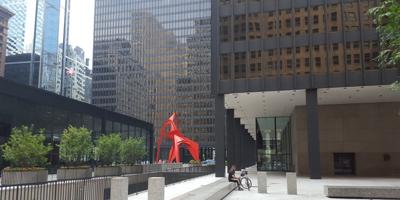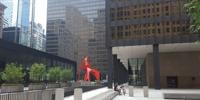
Dirksen Federal Courthouse, Chicago
CHICAGO – A company that sued a prominent asbestos law firm will get a second chance to prove racketeering allegations it says will be bolstered by new information from whistleblowers.
Chicago federal judge Robert Gettleman on Wednesday allowed J-M Manufacturing, a pipe company facing thousands of asbestos cases, to file an amended complaint against Simmons Hanly Conroy. Gettleman threw the first one out in March but wrote a plaintiff hoping to try again doesn’t need to show “extraordinary circumstances” to do so.
The next complaint will add allegations against other firms, including the Gori Law Firm and Sokolove Law.
“J-MM is thankful to whistleblowers who have come forward to share this information and expose the fraud and misconduct engaged in by Simmons Hanly, Sokolove, Gori, and others in connection with sham asbestos claims that generated billions of dollars in attorney’s fees at the expense of American businesses,” said Frank Fletcher, general counsel for J-MM
These new allegations warrant another try, Gettleman ruled. And the fact that J-MM didn’t reveal its proposed new complaint yet doesn’t stop it.
“Seventh Circuit case law… suggests that a plaintiff can show that the proposed amendment would cure the deficiencies in the prior complaint either by attaching a proposed amended complaint or by meaningfully describing the proposed amendment,” Gettleman wrote.
J-MM did that earlier this year when it asked for permission to re-file. It said insiders have shared new evidence of fraudulent practices at the Simmons firm, one of the main players in the nation’s busiest asbestos courts.
Those courts are located in the southern Illinois counties of Madison and St. Clair. Research by KCIC shows they accounted for nearly half of all asbestos lawsuits in the U.S. last year and that the Simmons firm has filed the third-most cases this year.
J-MM has been sued more than 6,000 times since 2000, including at least 400 filed by the Simmons firm. The company made a concrete pipe in the 1980s that contained asbestos.
It started its investigation after a former asbestos lawyer at Simmons sued the firm for retaliation for reporting alleged wrongdoing. Scott Peebles ultimately settled his case, but J-MM got involved with an effort to unseal certain portions of his allegations.
J-MM claimed in its lawsuit that its probe has discovered clients were coached on what to say about exposure to an asbestos-containing pipe the company produced, or they outright lied.
Key to asbestos claims is product identification. Plaintiffs are asked to recall products used decades ago on jobsites so their lawyers can sue the companies associated with them, though it is tough to determine the accuracy of the testimony.
The complaint cites a group of cases resolved within the last five years, including Sebastian Bretado's. He claimed he contracted mesothelioma while doing "line drainage" for landscapers in the 1980s.
During a deposition, Bretado was shown products and labels and asked if he remembered working with them. He answered that he had used a power saw and power drill on J-M's pipe, though the company says he couldn't remember any specific location he ever worked at, the full name of any co-workers or the names of any customers.
He provided the name of three employers, including Oak Ridge Landscaping. The two individual employers have passed, but their family members testified that they never ran any landscaping businesses, while the principal of Oak Ridge said the company never used the J-M pipe and that he didn't remember Bretado.
The first complaint tells several similar stories. Also alleged is the somewhat familiar pattern of hiding exposure claims against companies that went to the bankruptcy system (where payouts are limited) to first pursue maximum recoveries in the tort system, where a jury verdict could be eight-figures.
One of those big verdicts had J-M on the hook for more than $22 million of a $30 million penalty in California.
Last year when the Simmons firm moved to dismiss, it said J-M “has repeatedly sought to blame everyone but itself.”
"According to J-MM, sick and dying asbestos victims are liars, plaintiffs' lawyers are criminals, courts that allegedly refuse to 'sanction the firm or rein it in' are corrupt, and - when juries hold J-MM accountable for its actions - its own lawyers are incompetent," the motion said.






